
Imran Ahmed Khan Niazi is a Pakistani politician and former cricketer who served as the 22nd prime minister of Pakistan from August 2018 until April 2022. He is the founder and former chairman of the political party Pakistan Tehreek-e-Insaf (PTI) from 1996 to 2023. He was the captain of the Pakistan national cricket team throughout the 1980s and early 1990s.
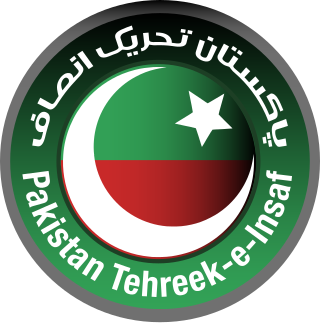
The Pakistan Tehreek-e-Insaf is a political party in Pakistan established in 1996 by Pakistani cricketer and politician Imran Khan, who served as the country's prime minister from 2018 to 2022. The PTI ranks among the three major Pakistani political parties alongside the Pakistan Muslim League–Nawaz (PML–N) and the Pakistan People's Party (PPP), and it is the largest party in terms of representation in the National Assembly of Pakistan since the 2018 general election. With over 10 million members in Pakistan and abroad, it claims to be the country's largest political party by primary membership, as well as one of the largest political parties in the world.
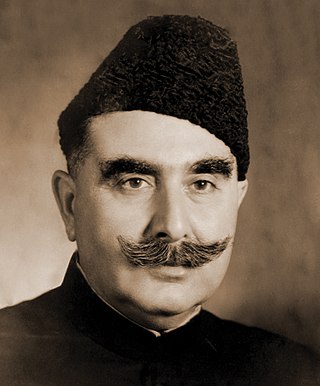
Sardar Abdur Rab Nishtar was a Pakistani independence activist and politician from the North-West Frontier Province. He served as the first Minister of Communications of Pakistan from August 1947 to August 1949 and then as the second Governor of West Punjab from August 1949 to November 1951.

Bilawal Bhutto Zardari is a Pakistani politician who served as the 37th Minister of Foreign Affairs, in office from 27 April 2022 to 10 August 2023. He became the chairman of Pakistan People's Party in 2007, following his mother's assassination. Bilawal belongs to the Bhutto family, a prominent political family of Pakistan and is the son of former Prime Minister Benazir Bhutto and President Asif Ali Zardari, and the grandson of former President Zulfikar Ali Bhutto. Bilawal had been a member of the National Assembly of Pakistan from 13 August 2018 till 10 August 2023. He re-elected as Member National Assembly of Pakistan in 2024 Pakistani general election from newly formed constituency NA-194 Larkana-I taken oath February 2024.
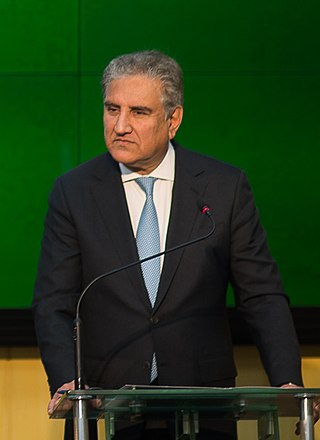
Makhdoom Shah Mahmood Hussain Qureshi is a Pakistani politician who served as the 29th Minister of Foreign Affairs from 2018 to 2022. He previously held the post from 2008 to 2011. He had been a member of the National Assembly from August 2018 till January 2023. He is the vice chairman of the Pakistan Tehreek-e-Insaf political party since December 2011. Previously, he was a member of the National Assembly from 2002 to May 2018.

Sir Michael Bayldon Barber is a British former public servant and educationist known for serving as Head of the Prime Minister's Delivery Unit under Tony Blair’s government. He was knighted in 2005 for his contributions. He is the founder and chairman of Delivery Associates, a global advisory firm.

Chile–Pakistan relations refers to the bilateral relations between Pakistan and Chile. The Embassy of Pakistan in Argentina is concurrent to Chile, likewise, the Embassy of Chile in the United Arab Emirates deals with matters pertaining to Pakistan.
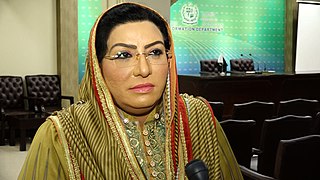
Firdous Ashiq Awan is a Pakistani politician from Istehkam-e-Pakistan Party. She has served as Special Assistant to Prime Minister on Information and Broadcasting from 2019 to 2020, Federal Minister for National Regulations and Services from 2012 to 2013, Federal Minister for Information and Broadcasting from 2011 to 2012 and as Federal Minister for Population Welfare from 2008 to 2010. She served as the Special Assistant to the Chief Minister of Punjab on Information and Culture, in office from November 2020 to 6 August 2021.

The Benazir Income Support Programme (BISP) is a federal unconditional cash transfer poverty reduction program in Pakistan. Launched in July 2008, it was the largest single social safety net program in the country with nearly Rs. 90 billion distributed to 5.4 million beneficiaries in 2016.

Sania Nishtar SI FRCP, is a Pakistani physician, cardiologist, senator, author and activist who was appointed CEO of Gavi, the Vaccine Alliance in 2024. Nishtar previously served as Special Assistant on Poverty Alleviation and Social Safety to the Prime Minister of Pakistan, with the status of Federal Minister, and chairperson Ehsaas Programme. She was elected to the Senate of Pakistan in the 2021 Senate election from Khyber Pakhtunkhwa. Previously she served in the interim federal cabinet in 2013 overseeing public health, education and science.
Prime Minister's Youth Programme is an initiative by the former prime minister of Pakistan Nawaz Sharif established in 2013. The purpose of the programme is to ensure the provision of quality education, and meaningful employment to the youth through integrated, sustainable youth initiatives. The programme provided government-subsidised business loans of up to 25 million rupees, under three tiers: first-tier for 10000 to 1 million, the second tier for 1 million to 10 million, and the third tier for 10 million to 25 million. The programme also provided a skills scholarship program, a talent hunt for youth sports, and a national youth council.

The Imran Khan government was the government of Pakistan which was formed by Imran Khan following his successful election as Prime Minister of Pakistan by the National Assembly. The cabinet had 25 federal ministers, 4 ministers of state and 4 advisors, most of whom assumed office on 20 August 2018.

Muhammad Amjad Saqib, is a Pakistani social entrepreneur, development practitioner, former civil servant and author. He is the founder and executive director of Akhuwat Foundation, which is the world's largest Islamic microfinance organization that provides interest-free loans to the most deserving segments of society.
The COVID-19 pandemic in Pakistan is part of the pandemic of coronavirus disease 2019 caused by severe acute respiratory syndrome coronavirus 2. The virus was confirmed to have reached Pakistan on 26 February 2020, when two cases were recorded. On 18 March 2020, cases had been registered in all four provinces, the two autonomous territories, and Islamabad Capital Territory, and by 17 June, each district in Pakistan had recorded at least one confirmed case of COVID-19.
Akhuwat Foundation is a nonprofit organization based in the country of Pakistan that provides interest-free loans to individuals who are unable to access formal financial services. It was founded in 2003 by Dr. Muhammad Amjad Saqib who is the executive director of the organization. Akhuwat's head office is located in Lahore and it has over 3 branches across 1,500 cities in Pakistan.

The National Command and Operation Center (NCOC) (April 2020-April 2022) was the principal body governing the policies and implementation of the national COVID-19 effort of Pakistan. It was formed in April 2020 on the orders of the Prime Minister of Pakistan Imran Khan to collate, analyze, and process information received from all provinces, AJK, Gilgit-Baltistan, and the Capital Territory. It also makes recommendations to the National Coordination Committee (NCC), which is headed by the Prime Minister for timely interventions relating to the national COVID-19 response effort.
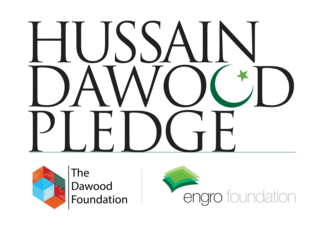
The Hussain Dawood Pledge (HD-Pledge) is one of the biggest private donations and initiatives to fight against the COVID-19 pandemic in Pakistan. Hussain Dawood, on behalf of Engro, Dawood Hercules and his family pledged on 2 April 2020 a contribution in services, kind, and cash of Pakistani rupee (PKR) 1 billion . The contribution became public a day after Prime Minister Imran Khan announced the coronavirus relief fund to fight the pandemic and urged everyone to donate.
The Poverty Alleviation and Social Safety Division is a division of the Cabinet Secretariat in Pakistan that was established in 2020. It's responsible for formulating and implementing policies and programs aimed at reducing poverty, improving social safety nets, and providing assistance to vulnerable segments of society.

The Prime Ministership of Imran Khan began when Imran Khan became the 22nd Prime Minister of Pakistan on 17 August 2018, following his inauguration ceremony, which came after his party, the Pakistan Tehreek-e-Insaf's victory in the 2018 Pakistani election. His campaign in the elections primarily focused on anti-corruption and populism.














